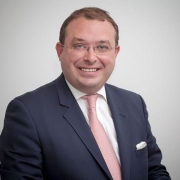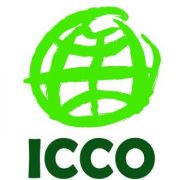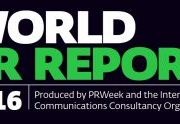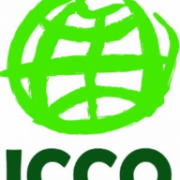Article by PRCA
The PR Census 2016 launched by PRCA has revealed that the UK PR industry is worth £12.9bn – over £3bn more than previous figures in 2013.
In 2016, the PR industry’s value is estimated to have grown by 34% since 2013 when it reached £9.62bn.
The PR Census 2016 has also revealed that the PR industry has grown to around 83,000 employees. This is an impressive level of growth since 2013 when it was 62,000 strong.
Launched yesterday, the PR Census 2016 is the most comprehensive and authoritative analysis of the PR industry, developed by the PRCA in conjunction with PRWeek and global research house YouGov.
Francis Ingham MPRCA, Director General, PRCA, said:
“Three things stand out for me from the PR Census 2016.
“The first is growth. Our industry is surging ahead, becoming bigger and bigger. And that growth is seen in pretty much every sector. The industry, it seems to me, has settled down to a balance between what we used to think of as its new and its traditional forms.
“The second is difference. Differences in gender balance; in pay; in expertise and duties. The industry is composed of plenty of unique hubs of PR excellence all around the country, all powering forward in slightly different manners.
“And the third is challenge. The gender pay gap is still obvious, and still troubling. We still recruit from too narrow a circle, denying ourselves access to some outstanding talent. And far too many of our industry still –remarkably- turn to AVEs when measuring their impact.
“We intend using every bit of influence we have to address every one of those challenges.”
Danny Rogers FPRCA, Editor-in-Chief, PRWeek, said:
“As someone who has been in and around this industry for two decades – first as a graduate trainee in PR, and later as an industry editor and author – what strikes me about the PR Census, is how little the big themes actually change.
“We are still discussing the future of print, the hot growth of healthcare and tech, the difficulties of measurement and the lack of diversity. But the industry is getting most things right. Because for most of those two decades UK PR spend has been growing rapidly, and continues to do so. Another constant is PR’s adaptability – and this is more critical than ever as technology and media rapidly transform each other.”
The PR Census 2016 also revealed:
Demographics
The PR industry remains a young industry, with an average age of 28. It is a female-led industry, with 64% of its employees being women. 34% of PR people have children or dependents.
There has been little change in PR’s diversity since 2011, with 91% being white and 89% being British. However, the youngest generations in the industry represent important improvements in diversity levels.
Undergraduate degrees remain the predominant highest form of education, a fact that becomes more prevalent with each younger generation.
Opinions
51% of industry members believe that PR is a profession. 40% see it as an industry.
The Barcelona Principles 2.0 are the leading form of PR evaluation, but AVEs remain a significant measurement format.
Technology and health are the mostly hotly-tipped sectors to increase investment in PR in the coming years.
Digital, S.E.O., and online communications are seen as the tasks that have most increased in importance over the last two years, and also those that will increase most in the coming years.
Sales promotion, general media relations and writing articles, newsletters etc, are the roles thought to have most decreased in importance over the past two years.
What do we do?
Our leading duties are general media relations, media relations strategy planning, and digital and social media.
The senior members of the industry oversee communications strategy development and reputation management; while younger members handle general media relations and writing.
Technology and consumer services, media, and marketing continue to be the most prevalent sectors in which PR agencies work.
PR agencies are most likely to be made up of between 11-50 people. In-house teams are overwhelmingly made up of 2-5 people, regardless of organisational size.
Salaries, benefits and working hours
The average PR salary is £45,100, down from £53,781 in 2013.
The average agency salary is £44,805, down from £54,311 in 2013. Pay at the senior levels has fallen, but professionals who are Account Director-level or below have seen a small increase.
In-house salaries increase more uniformly, and the average salary is £43,591, down from £50,438.
The average freelancer salary is £56,789, down from £73,322 in 2013.
There is a significant pay disparity between men and women, an average of £9,111.
The highest salaries in PR agencies go to those handling central government work, alongside retail and wholesale, and food, beverages and tobacco. In-house salaries peak for those working for technology, finance, and utilities companies.
PR professionals are contracted to work, on average, 35 hours a week. However, the average amount of time they are actually working is 45 hours a week.
The leading form of flexible working in the PR industry is flexitime (core hours with flexible start and finish) which is taken up by 28% of the industry.
ENDS
The market sizing data was calculated by taking a combination of historical data from the previous PR Censuses published in 2011 and 2013, combined with PRCA benchmarking studies, and the Government’s ONS tables of industry sizing and growth.
The online survey generated 1,874 responses, and was generated by YouGov using two different sample sources:
- Targeted sample sent to PRCA members and PRWeek subscribers
- Public link on PRWeek and PRCA websites
The fieldwork was undertaken between 17th February – 26th April 2016.
About PRCA UK
Who we are: Founded in 1969, the PRCA is a UK-based PR membership body, operating in 45 countries around the world. We represent in excess of 20,000 people across the whole range of the PR industry. The PRCA promotes all aspects of public relations and internal communications work, helping teams and individuals maximise the value they deliver to clients and organisations.
What we do: The Association exists to raise standards in PR and communications, providing members with industry data, facilitating the sharing of communications best practice and creating networking opportunities.
How we do it and make a difference: All PRCA members are bound by a professional charter and codes of conduct, and benefit from exceptional training. The Association also works for the greater benefit of the industry, sharing best practice and lobbying on the industry’s behalf e.g. fighting the NLA’s digital licence.
Who we represent: The PRCA currently has more than 400 agency members; 270 in-house communications teams from multinationals, charities and leading public sector organisations; and thousands of individual members.













